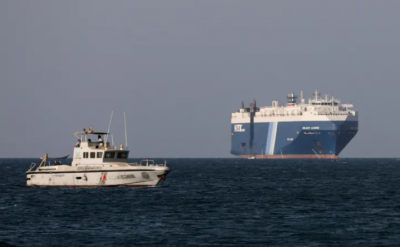Sources have announced that war risk insurance companies have raised premiums for American, British, and Israeli ships passing through the Red Sea by up to 50 percent, while some insurance service providers are avoiding coverage for such vessels due to the targeting of ships by the Houthi group. The attacks carried out by the Iranian-aligned Houthis since November have slowed trade between Asia and Europe and raised concerns among major powers. The Houthis claim that their attacks are conducted in solidarity with the Palestinians amid the ongoing Israeli war with the Palestinian Islamic resistance movement (Hamas) in Gaza. Many companies have resorted to rerouting ships around South Africa, although some vessels still traverse the Red Sea.
David Smith, head of marine and maritime commitments at McGill & Partners insurance, stated that vessels related to the United States, Britain, or Israel are now paying an additional war risk premium ranging from 25 to 50 percent more than other ships crossing the Red Sea. Two insurance industry sources indicated that ships linked to the U.S., UK, or Israel will be subject to higher premiums of more than 50 percent. Marcus Baker, global head of marine and cargo services at Marsh insurance, mentioned, "The ships that have faced issues so far are almost all connected in some way to Israeli, American, or British ownership."
Some insurance companies are currently avoiding coverage for such operations. In one of the most dangerous incidents, a tanker operated by a UK-based company, whose cargo was owned by global commodity trading company Trafigura, was hit by a missile that caused a fire, which was later extinguished.
Insurance industry sources stated that war risk insurance premiums for Red Sea voyages have reached about one percent of the vessel's value in the past ten days, up from about 0.7 percent previously, with various discounts applied by insurance companies. This translates to hundreds of thousands of dollars in additional costs for a seven-day voyage. Monroe Anderson, chief operations officer at Vessel Protect, a shipping insurance and war risk specialist, noted that the apparent safe passage offered by the Houthis to ships flying the flags of Russia and China, or owned by them, including those from Hong Kong and Iran, is intended to provide a degree of assurance to trade markets linked to those nations.
Shipping data showed that vessels are also adding messages to their declared identification data, clarifying the presence of a Chinese crew on board or stating that they have no connection to British, American, or Israeli companies. Israeli shipping company Zim has announced that it is diverting its vessels away from the Red Sea. The British maritime risk and security consultancy Dryad Global has advised its clients to avoid the region until further notice. Corey Ranslem, CEO of Dryad Global, expressed his astonishment that ships flying the flags of the U.S. and UK or operated by companies from those countries are still crossing the Red Sea and the Gulf of Aden, labeling them as the most vulnerable to attacks in that area. He added, "Ships operated by Iran, Russia, and China flying the flags of these countries are the only vessels that can safely pass through this region. The Iran-aligned Houthis will not attack ships carrying these flags or affiliations because Russia and China are sympathetic to Iran."
Concerns are growing regarding the possibility that the repercussions could affect other ships.




